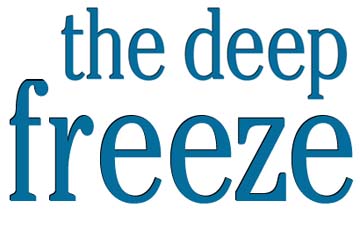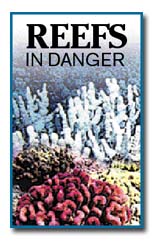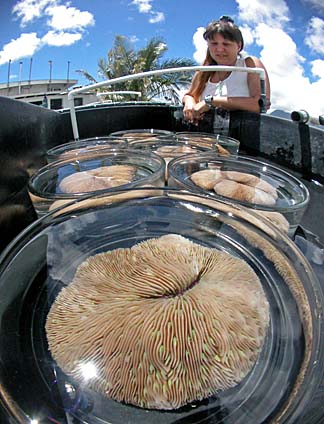
ON THE BRINK OF A BREAKTHROUGH:
IN VITRO CORAL
Dave Krupp, associate professor of marine and biological science at Windward Community College, held up a mushroom coral yesterday at the University of Hawaii's Institute of Marine Biology.
Scientists at UH work to
freeze coral embryos to help
save threatened species
Scientists on Oahu's Coconut Island are trying to freeze coral embryos, groundbreaking work that could ultimately help ensure the survival of threatened coral species worldwide.
If they succeed, they believe they'll be the first in the world to freeze coral.
They're using the same basic techniques that have allowed freezing of eggs, sperm, and embryos of humans and other mammals for years.
But working with coral requires fine-tuning methods and materials, including the chemical mix of the "antifreeze" that's used instead of water to take the corals to a super-cold temperature.
Yesterday's first try at the University of Hawaii's Institute of Marine Biology yielded predictable results, the researchers said: The coral embryos fell apart after going to freezing and back. Unfazed, they immediately began mixing up chemical solutions that would let the coral survive the journey back from freezing.
The work is being done on mushroom coral (Fungia scutaria), a species that is not in danger of extinction. But the techniques learned from this coral, common in Kaneohe Bay, could be transferred to endangered corals, said project team leader Mary Hagedorn, a marine biologist from the Smithsonian Institution's National Zoological Park.
A close-up of mushroom coral reveals an intriguing pattern.
The current hot spot for coral reef damage is in the Caribbean, she said. Any techniques developed out of her team's research would probably be used there first, she said.Coral reefs around the world are being threatened by global warming, soil erosion and pollution, overfishing and overuse for recreation.
Frozen coral could be stored in a "frozen zoo" until needed to replenish a damaged area, scientists said.
"It's like an insurance policy," Hagedorn said. "Sometimes humans can't act fast enough to save endangered species. This technique could give us a cushion."
Hagedorn is so excited about freezing coral that she took a year off from her job at the Smithsonian to work on this project at the UH institute on Coconut Island in Kaneohe Bay.
"I think this is really important," she said yesterday. "The coral reefs are like the rain forests of the ocean," with a large number of diverse animals and plants.
Hagedorn has enlisted the aid of highly respected specialists in cryopreservation -- the science of keeping living genetic material in cold storage, then thawing them out and growing them.
Others on the team include chemists Peter Mazur of the University of Tennessee at Knoxville and Doug MacFarlane of Australia's Monash University; physicist Frederick Kleinhaus of Indiana and Purdue universities; William Rall of the National Institutes of Health; and Gregory Fahy of 21st Century Medicine in Rancho Cucamonga, Calif.
Twenty years ago, Fahy and Rall developed a quick-freezing process called vitrification that revolutionized freezing living things.
All have taken vacation or personal time to come to Oahu and collaborate for a few weeks, centered around the July spawning of the mushroom coral, Hagedorn said. The species spawns two days after the full moon during the summer months and the July spawn began Saturday.
Although the coral animal is stationary, its embryos swim for up to a week after their formation during spawning. The scientists will be trying different methods of freezing the coral during this period.
After being held about an hour at minus 320 degrees Fahrenheit in liquid nitrogen, the coral embryos will be thawed and examined.
Hagedorn said she will consider the experiment a success if even one coral embryo thaws intact.
Lab assistant Lea Hollings-worth cleaned the mushroom-coral enclosures of algae yesterday at the UH facility on Coconut Island.
BACK TO TOP |
Learn more about coral
Coral reef experts will offer free talks on coral spawning, reef fish and coral reef ecosystem management, 6 to 9 p.m. Saturday at the Hanauma Bay Nature Preserve.The family event will include talks, hands-on activities for kids and poster displays from various coral reef organizations, as well as nighttime snorkeling in the bay.
This event is cosponsored by the Hawaii Living Reef Program and the University of Hawaii Sea Grant's Hanauma Bay Education Program.
For more information on Hawaii's Living Reef Evening, call 397-2664 or 397-5840. For more information about Hawaii coral reefs, see www.hawaiireef.org




